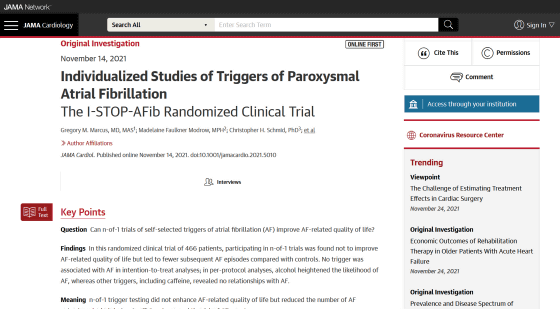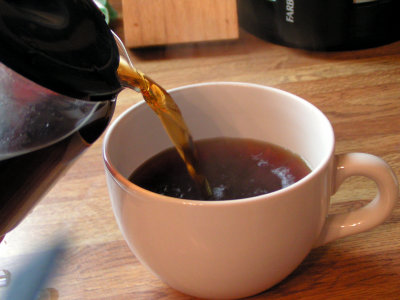'Alcohol' turns out to be the main trigger that causes a type of arrhythmia

Atrial fibrillation is one of the most common types of arrhythmia, in which a disordered electrical signal is generated in the 'heart' that receives blood sent from a vein and sends it to the ventricle of the recipient, causing the heart to quiver 300 to 600 times per minute. It refers to a state in which a large contraction occurs. It is said that there are several 'triggers' for such atrial fibrillation attacks, and a research team at the University of California, San Francisco, tracked patients who actually suffered from atrial fibrillation and said, 'What? Is the trigger for atrial fibrillation? '
Individualized Studies of Triggers of Paroxysmal Atrial Fibrillation: The I-STOP-AFib Randomized Clinical Trial | Atrial Fibrillation | JAMA Cardiology | JAMA Network
https://jamanetwork.com/journals/jamacardiology/article-abstract/2786196

Only Alcohol – Not Caffeine, Diet or Lack of Sleep – Might Trigger Heart Rhythm Condition | UC San Francisco
https://www.ucsf.edu/news/2021/11/421881/only-alcohol-not-caffeine-diet-or-lack-sleep-might-trigger-heart-rhythm
Atrial fibrillation commonly triggered by alcohol consumption
https://www.openaccessgovernment.org/alcohol-consumption-associated-with-heart-condition/124902/
Irregular contractions of the heart caused by atrial fibrillation are also transmitted to the ventricles, causing irregular pulse and discomfort and discomfort in the chest, as well as palpitation, shortness of breath, dizziness, oppression, and anxiety. Symptoms such as appear. Since the number of cases increases as the age increases, it is said that more than 10% of the elderly aged 80 and over are seen, and it is said that there are more than 1.3 million patients in Japan alone.
Atrial fibrillation is a relatively low-severity arrhythmia that is rarely a direct cause of death, as some patients have no subjective symptoms and are accidentally discovered during a medical examination. However, atrial fibrillation contributes to more than 150,000 deaths annually in the United States because it contributes to the formation of blood clots and causes serious illnesses such as cerebral infarction and embolism. It is said that it is increasing year by year.
Many patients report that seizures are caused by various 'triggers', which are alcohol intake, caffeine intake, lack of sleep, lying down on the left side of the body (heart down), and exercise. It is said that there is something like that. So a research team at the University of California, San Francisco conducted a study to track real patients and analyze the relationship between triggers and seizures to see how much each trigger actually causes atrial fibrillation.

About 450 patients with atrial fibrillation who participated in the experiment were 58% male and 92% white. The research team used a smartphone app for 10 weeks to give patients various behaviors that could trigger atrial fibrillation, such as caffeine intake, alcohol intake, lack of sleep, lying down on the left side, eating big, and exercising. I asked you to record. Patients during the study also wore a mobile electrocardiography device to measure when atrial fibrillation occurred.
In addition to this, for some patients, the research team randomly 'dare to expose to the triggers' for each week for various triggers based on the 'triggers of atrial fibrillation that I think' that each patient reported in advance. We also conducted a randomized clinical experiment to investigate the relationship between each trigger and atrial fibrillation. In addition, the triggers self-selected by the patients include caffeine intake (53 people), alcohol intake (43 people), sleep deprivation (31 people), exercise (30 people), and lying down on the left side (left side down). 17 people) ・ Refrain from drinking water (10 people) ・ Gluttony (7 people) ・ Ingestion of cold food and drink (5 people).
Analysis of the results showed that only 'alcohol intake' was associated with atrial fibrillation among the triggers, and that caffeine intake and other triggers, which were the most self-reported, were atrial fibrillation. The research team reports that there was no relevance.
'Caffeine was the most commonly selected trigger in the test, but no evidence of a short-term relationship between caffeine intake and atrial fibrillation was found,' said Gregory Marcus , the lead author of the paper. In contrast, alcohol intake has consistently been shown to increase the risk of atrial fibrillation. '

Related Posts:







